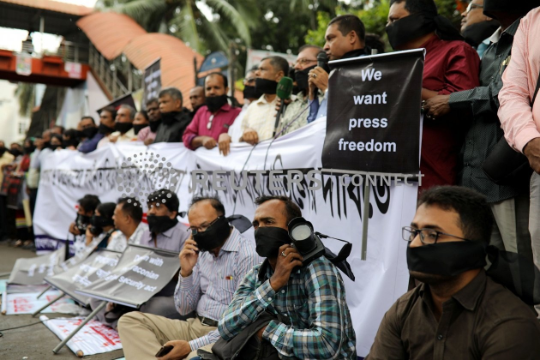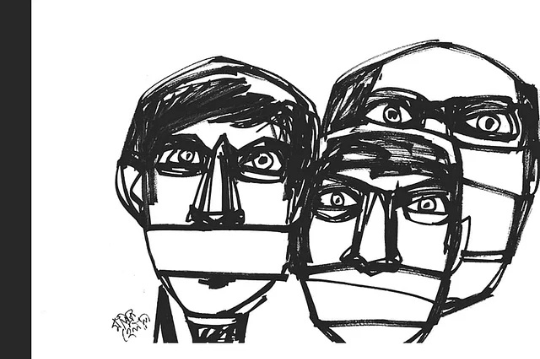The case for rescinding the Digital Security Act
Published on 07/03/2021

C R Abrar
They were both active, conscientious, thinking citizens. Both were passionate about social issues, and were gifted—one had a penchant for writing, the other for drawing cartoons. Both were tech-savvy and loved sharing their views on social media, banding together to set up a digital platform proudly titled "I am Bangladeshi". Both were under the belief that as citizens of a democratic country, they were relatively free to express their views and had the protection of the constitution and the law. Unfortunately, as events would reveal, they were both sadly mistaken on that count. When the time came, the facade of protection crumbled. One had to pay the ultimate price, as his soul, yearning for freedom, sneaked out of the prison van; the other now languishes in severe bodily pain, mourning his comrade who promised him company to see the Everest after "they get out and get fit".
Within months of the infamous Kajol episode, the Mushtaq Ahmed and Kishore Kabir tragedies have unleashed citizens' fury against the Digital Security Act (DSA). Every freedom-loving citizen has rallied behind the call for rescinding the DSA. Termed as the "killer Act", "an archaic legislation" and "a medieval law", critics have argued that it cannot exist in a democratic polity as it blocks people's voices. The mixing of the concepts of "criticism of government" and "sedition", and interchangeable use of terms like "anti-government" and "anti-state" in the Act's application, is evidence enough that it was framed not in the interests of the people/state, but of those in command of the state apparatus. Litmus papers have turned red in all three cases (Kajol, Mushtaq and Kishore) with regard to the efficacy of the law.
The DSA substantively curtails freedoms of expression, thought and the media. With its vague provisions, the law was open to abuse from the very beginning. It targeted free thinkers, journalists and dissenting voices. Not surprisingly, it was enacted only months before the 2018 elections. The law was framed without consultation with major stakeholders. Those involved in the drafting of the law refused to take into account the inputs of those who were likely to be most affected by its application. In response to the widespread condemnation about the draconian contents and broad sweep of the law, the umpteen numbers of ministerial promises to amend it and introduce Rules to clarify the ambiguities have remained undelivered. The non-bailable provisions have made the law inherently unfair. As Barrister Jyotirmoy Barua, counsel for both Mushtaq and Kishore, observed, it deprives the accused of the opportunity to put up a legal fight that s/he generally enjoys and "there is no scope for the accused to get justice".
The Bangladesh police headquarters has reported that in the first five months alone of 2020, 403 cases were filed and 353 arrests were made under the Act. No further information was made available for the subsequent seven-month period.
A detailed analysis of 197 cases of 2020 by Prothom Alo found that most of the cases were filed for "making adverse remarks" (kotukti), "defamation", "sharing distorted images", "spreading rumours" and "conspiracy against the state". In 80 percent of instances, the plaintiff was either leaders or activists of the ruling party or police. Of the 197 cases, 88 were filed by Awami League MPs, union council chairs and activists of youth, student and volunteer wings of the ruling party, and 70 more were filed by the police. Journalists were the principal targets.
The investigation further revealed that the news items for which journalists were charged included theft of relief goods, criticism of Covid-19 treatment arrangements, criticism of actions of local MPs and public representatives, and land/property grabbing by the locally powerful. Some cases were filed for updating Facebook statuses on current topics, and criticisms of MPs and local government representatives. Of the 197 cases, as many as 48 were filed for allegedly publishing false news against MPs, public representatives and ruling party activists; 40 for objectionable posting against Bangabandhu, the president, prime minister and other important persons of the state, and 30 for passing adverse remarks against religion, hurting religious sentiments and spreading communal hatred.
The tenuous nature of the charges is evident from the following figures. In the last seven years, of the 2,682 cases filed at the Dhaka Cyber Tribunal—the only competent court to try cases under the ICT Act and DSA—990 were disposed of up to September 2020. Of those, more than 400 were disposed of after the final report. In many cases, the accused were exonerated as there was not enough evidence to support the charges. In merely 25 cases, the state was able to prove the charges. Of these, 24 were filed under the ICT Act and only one under the DSA.
Thus, there is little doubt that instead of providing redress to the aggrieved, the DSA has come in as a handy tool to suppress those who may hold contra views or dare to question and expose the wrongdoings of those who hold power. The fact that most of the provisions are made non-bailable means that the accused may have to endure incarceration for prolonged periods, even before s/he is found guilty. It therefore provides some quarters, who do not wish to be accountable and be questioned for their deeds, an opportunity to abuse the law. This provision of the law is contrary to the tenets of the rule of law and human rights. As rights lawyer Jyotirmoy Barua further states "any application (of such an inherently flawed law), itself is a misapplication".
A brief examination of Mushtaq and Kishore's cases would reveal the extent of the misapplication of the law and the propensity of law enforcers to circumvent the rule of law.
Firstly, in his interview with The Daily Star within hours of his release, Kishore alleged that he was picked up by 17 plainclothesmen, some brandishing weapons, without any warrant or identity documents. This is a violation of the law and High Court order.
Secondly, Kishore was picked up an hour before Iftaar on May 2, 2020 and produced before the magistrate on May 6. The concerned agency claimed that he was picked up at 2:30 am on May 5 and thus within the time-frame allowed under the law. In reality, if one goes by Kishore's statement about the timing of his arrest, one has to surmise that he was involuntarily disappeared during the interim days.
Thirdly, Kishore alleges that members of law enforcement agencies tried to plant red tablets and a gun among his stack of books, presumably to implicate him for possession of drugs and firearms. If true, this begs the question among ordinary citizens—in their stride to prove the innocent guilty on behalf of certain quarters, have the law enforcement agencies jettisoned their much-cherished professionalism, and moral and legal codes?
Fourthly, even though, like writer Mushtaq, cartoonist Kishore had no past record of engaging in violence, neither did he pose any threat to society; he was denied bail on six previous occasions by the magistrate. Mushtaq was denied bail seven times. Is securing bail not a right for every citizen? Isn't it unlawful to put someone in detention for ten months in the pre-trial stage (under jail code, it would be deemed as one year) before being proven guilty?
Fifth, under the law, the investigation report in Mushtaq's case was due in 60 days, that is, on July 20, 2020, but it was submitted on January 11, 2021, after 10 months. The investigating officer failed to secure permission for delayed submission (for a maximum of 105 days) from the concerned authorities. Both Mushtaq and Kishore were in custody for 270 days each. Is this not a gross breach of the law?
Sixth, on the final day of Kishore's court appearance, the police asked for another round of remand. Asking for remand after submission of the charge sheet without producing fresh evidence, and without presenting the accused before the court, is not in accordance with the law and judicial practice.
The above points clearly illustrate that in apprehending and prosecuting both Mushtaq and Kishore under the DSA, members of law enforcement agencies committed a number of irregularities, some of which amount to severe breaches of the law itself. The tragic death of Mushtaq and the violent treatment that was meted out to Kishore must influence those at the helm of the state to acknowledge that the DSA is not a pro-people law, and does not in any way serve the interests of the state.
There has been outrage at the death of Mushtaq and Kishore's treatment in custody. Demands have been raised to rescind the DSA. Careful and well thought-out amendments of a few provisions of the ICT Act would be enough to address the concerns of digital safety, of the citizens and the state. Thus, one hopes the government will pay heed to these calls to scrap the DSA. The golden jubilee of Bangladesh's independence provides a perfect opportunity to make a declaration to that effect and renew the compact between the government and the people.
The name of Mushtaq's Lalmatia residence is Parampara (from generation to generation). There is little doubt that the torch of liberty that Mushtaq so ardently upheld with his colleague Kishore, and gave his life for, will continue to inspire new generations of Bangladeshis to stand up for their rights and freedoms.
News Courtesy:
https://www.thedailystar.net/opinion/news/the-case-rescinding-the-digital-security-act-2055997




